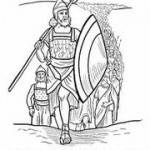Chris Wright: the conquest of Canaan

This event is rightly unsettling. Christopher Wright offers some points to help us evaluate it ethically:
- It was a limited event. The conquest narratives describe one particular period of Israel’s long history. Many of the other wars that occur in the OT narrative had no divine sanction, and some were clearly condemned as the actions of proud, greedy kings or military rivals.
- We must allow for the exaggerated language of warfare. Israel, like other ancient Near East nations whose documents we possess, had a rhetoric of war that often exceeded reality.
- It was an act of God’s justice and punishment on a morally degraded society. The conquest shouldn’t be portrayed as random genocide or ethnic cleansing. The wickedness of Canaanite society was anticipated (Gn 15:16) and described in moral and social terms (Lv 18:24; 20:23; Dt 9:5; 12:29–31). This interpretation is accepted in the NT (e.g., Heb 11:31 speaks of the Canaanites as “those who disobeyed,” implying awareness of choosing to persist in sin—as the Bible affirms of all human beings). There’s a huge moral difference between violence that’s arbitrary and violence inflicted within the moral framework of punishment (this is true in human society as much as in divine perspective). It doesn’t make it “nice,” but it changes the ethical evaluation significantly.
- God threatened to do the same to Israel—and He did. In the conquest God used Israel as the agent of punishment on the Canaanites. God warned Israel that if they behaved like the Canaanites, He would treat them as His enemy in the same way and inflict the same punishment on them using other nations (Lv 26:17; Dt 28:25–68). In the course of Israel’s long history in OT times, God repeatedly did so, demonstrating His moral consistency in international justice. It wasn’t a matter of favoritism. If anything, Israel’s status as God’s chosen people, the OT argues, exposed them more to God’s judgment and historical punishment than the Canaanites who experienced the conquest. Those choosing to live as God’s enemies eventually face God’s judgment.
- The conquest anticipated the final judgment. Like the stories of Sodom and Gomorrah and the flood, the story of Canaan’s conquest stands in Scripture as a prototypical narrative, or one that foreshadows what is to come. Scripture affirms that ultimately, in the final judgment, the wicked will face the awful reality of God’s wrath through exclusion, punishment, and destruction. Then God’s ethical justice will finally be vindicated. But at certain points in history, such as during the conquest period, God demonstrates the power of His judgment. Rahab’s story, set in the midst of the conquest narrative, also demonstrates the power of repentance, faith, and God’s willingness to spare His enemies when they choose to identify with God’s people. Rahab thus enters the NT hall of fame—and faith (Heb 11:31; Jms 2:25).
Apologetics Study Bible, art. ‘Is the Old Testament Ethical?’ (Numbering and emphasis added).